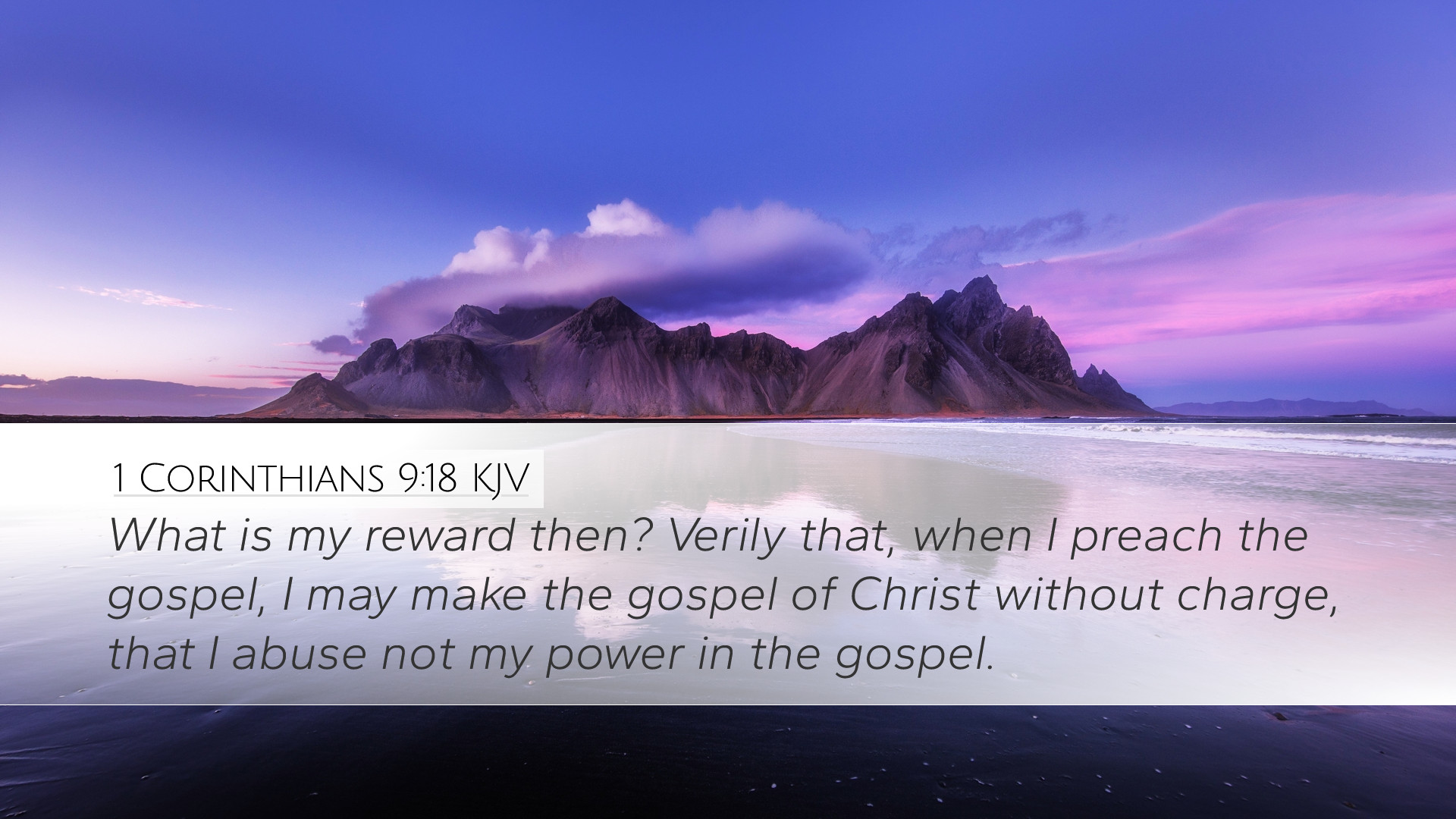Commentary on 1 Corinthians 9:18
Verse Overview: 1 Corinthians 9:18 states, "What then is my reward? That, when I preach the gospel, I may present the gospel of Christ without charge, that I abuse not my power in the gospel." This verse captures the Apostle Paul's dedication to the integrity of the gospel message and the principles of service and sacrifice in ministry.
Contextual Analysis
This verse is situated within Paul’s defense of his apostleship and ministry. The context reveals a concern for the perception of his authority and the motivation behind his actions. Paul refrains from taking financial support from the Corinthians, and he does this deliberately to avoid any hindrance to the gospel.
Key Insights from Commentaries
- Matthew Henry's Commentary: Henry emphasizes the idea that Paul was not motivated by monetary gain but rather by a desire to serve others. He highlights that the Apostle's willingness to forego payment demonstrates his commitment to the gospel’s purity. The absence of his own financial demand serves to highlight the message he preached rather than to distract from it through personal interests.
- Albert Barnes' Notes: Barnes aligns with this idea, noting that Paul viewed his ministry as a calling to exalt Christ rather than to seek personal advantage. He underscores the significance of presenting the gospel without charge, describing it as a means to demonstrate the gospel's intrinsic value. This act of self-denial fosters a more receptive audience and illustrates the nature of true discipleship.
- Adam Clarke's Commentary: Clarke adds a practical dimension, mentioning the cultural context of Corinth where figures could be perceived as mercenaries if they accepted compensation. He explains that Paul’s choice to preach freely was a tactical decision to build credibility and trust with the Corinthian church. Clarke comments on the broader implications of this approach to ministry in fostering genuine relationships.
Theological Implications
The implications of 1 Corinthians 9:18 stretch beyond the immediate context of Paul’s mission. It invites deeper reflection on the nature of ministry in relation to financial support and personal sacrifice. For contemporary theologians and pastors, this verse serves as a challenging reminder of the motivations behind preaching and the heart posture required in ministry.
1. Sacrificial Service
One of the enduring lessons of this passage is the call to sacrificial service. Paul exemplifies how true leaders in the faith should be prepared to forego their rights and comforts for the sake of others and the integrity of the gospel message. This selflessness resonates with Jesus' teachings and the early church’s practices.
2. Integrity in Ministry
In a world where motives are often questioned, Paul’s commitment to present the gospel free of charge offers insights for modern ministry. The emphasis on integrity speaks to the importance of maintaining a clear distinction between gospel work and personal financial ambition, encouraging leaders to earnestly evaluate their motivations and the ethical implications of their ministry strategies.
3. Cultural Adaptation
Paul's adaptive methods in reaching diverse audiences present a significant concept for missionaries and church leaders today. The principle of becoming 'all things to all people' (1 Corinthians 9:22) calls for flexibility and cultural sensitivity while remaining anchored in the truth of the gospel. Such adaptability can lead to more meaningful connections with varied communities.
Practical Applications
Reflecting on 1 Corinthians 9:18, pastors and church leaders can draw several practical applications:
- Evaluate Financial Practices: Leaders should critically examine financial arrangements within their ministries to ensure they reflect the values of transparency and integrity as modeled by Paul.
- Prioritize Gospel Integrity: The focus must always remain on presenting the gospel; thus, steps should be taken to minimize any distractions or conflicts of interest that may arise from financial support.
- Encourage Generosity: Just as Paul did not take compensation from the Corinthians, church leaders should foster cultures of generosity, encouraging congregants to support the spread of the gospel without expecting anything in return.
- Engage in Cultural Contextualization: Understanding the cultural context can enhance dialogue and outreach efforts, ensuring the gospel is communicated in relatable ways that maintain its truth and substance.
Conclusion
1 Corinthians 9:18 beckons leaders to reflect on their calling to serve the gospel selflessly. By examining Paul’s example, pastors and scholars alike can glean invaluable wisdom regarding integrity, sacrifice, and the true essence of Christian leadership. As they continue to explore the depths of this passage, they are urged to remain committed to proclaiming the gospel with purity and passion.


